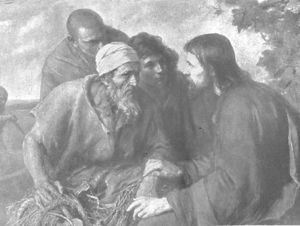Template:Apostles: Difference between revisions
No edit summary |
No edit summary |
||
| Line 1: | Line 1: | ||
[[File:Jesusteach.jpg|right|300px|thumb|To think like [[Christ]] you may need to change the way you think. We are [[warnings|warned]] about a [[strong delusion]] that will deceive ''many''. [[Jesus]] came to take the [[Kingdom of God|kingdom]] from those who were [[teach]]ing something different from [[Moses]] | [[File:Jesusteach.jpg|right|300px|thumb|To think like [[Christ]] you may need to change the way you think. We are [[warnings|warned]] about a [[strong delusion]] that will deceive ''many''. [[Jesus]], according to his own words,came to take the [[Kingdom of God|kingdom]] from those who were [[teach]]ing something different from [[Moses]]. Their [[Corban]] was making the word of God to none effect. Jesus [[appoint]]ed a kingdom to His [[Apostles]] so that they would bear witness and through the [[Holy Spirit]] the people would bear [[fruit]]. Through [[Christ]] the [[world]] might be [[saved]] if the people would [[repent]] and [[seek]] the [[kingdom of God]] and His [[Righteousness]].]] | ||
| Line 7: | Line 7: | ||
The word ''Apostolos'' is from the Greek word ''apostello'' meaning ''to send, to order (one) to go to a place appointed''. An ambassador from Greece would be called an ''Apostolos'' and certainly the [[Apostle]]s were ambassadors from the [[kingdom of God]] to the [[world]]. It appears 78 times as '''apostle''' but twice as ''messenger''. It could include anyone who is ''a delegate, messenger, one sent forth with orders''. While it might be "specifically applied to the twelve apostles of Christ" but in a broader sense applied to others who are spiritually sent or delegated by God as prophets or teachers or any task. | The word ''Apostolos'' is from the Greek word ''apostello'' meaning ''to send, to order (one) to go to a place appointed''. An ambassador from Greece would be called an ''Apostolos'' and certainly the [[Apostle]]s were ambassadors from the [[kingdom of God]] to the [[world]]. It appears 78 times as '''apostle''' but twice as ''messenger''. It could include anyone who is ''a delegate, messenger, one sent forth with orders''. While it might be "specifically applied to the twelve apostles of Christ" but in a broader sense applied to others who are spiritually sent or delegated by God as prophets or teachers or any task. | ||
The [[kingdom of God]] is | The [[kingdom of God]] is [[one form of government]] where its ministers are servants with no offices where men ''[[exercise authority]]'' one over another. | ||
There is only one denomination of His Church because Christ and his doctrines is the common denominator. | |||
Only God delegates men to be His Apostles. If any man preach a doctrine other than that which Jesus he is not an apostle. | |||
An apostle may have authority over things that by their nature and circumstance belong to God. This would be things freely given to men who belonged to God. The apostles seemed to actually belong to God as they considered themselves to be [[bondservant]]s. | |||
Revision as of 00:57, 12 May 2021

Apostolos
The word Apostolos is from the Greek word apostello meaning to send, to order (one) to go to a place appointed. An ambassador from Greece would be called an Apostolos and certainly the Apostles were ambassadors from the kingdom of God to the world. It appears 78 times as apostle but twice as messenger. It could include anyone who is a delegate, messenger, one sent forth with orders. While it might be "specifically applied to the twelve apostles of Christ" but in a broader sense applied to others who are spiritually sent or delegated by God as prophets or teachers or any task.
The kingdom of God is one form of government where its ministers are servants with no offices where men exercise authority one over another.
There is only one denomination of His Church because Christ and his doctrines is the common denominator.
Only God delegates men to be His Apostles. If any man preach a doctrine other than that which Jesus he is not an apostle.
An apostle may have authority over things that by their nature and circumstance belong to God. This would be things freely given to men who belonged to God. The apostles seemed to actually belong to God as they considered themselves to be bondservants.